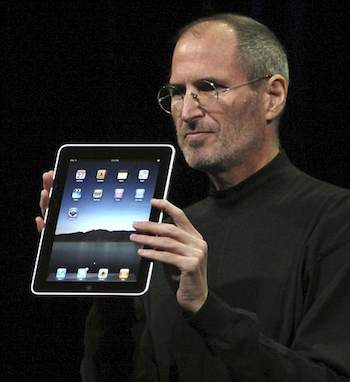- MENU
- HOME
- SEARCH
- WORLD
- MAIN
- AFRICA
- ASIA
- BALKANS
- EUROPE
- LATIN AMERICA
- MIDDLE EAST
- United Kingdom
- United States
- Argentina
- Australia
- Austria
- Benelux
- Brazil
- Canada
- China
- France
- Germany
- Greece
- Hungary
- India
- Indonesia
- Ireland
- Israel
- Italy
- Japan
- Korea
- Mexico
- New Zealand
- Pakistan
- Philippines
- Poland
- Russia
- South Africa
- Spain
- Taiwan
- Turkey
- USA
- BUSINESS
- WEALTH
- STOCKS
- TECH
- HEALTH
- LIFESTYLE
- ENTERTAINMENT
- SPORTS
- RSS
- iHaveNet.com
David LaGesse

Forecasts vary widely on just how hot the iPad will be, but the yet-to-be-released device is igniting the speculative fever that often descends on Apple launches. The tablet PC hits stores on Saturday after weeks of brisk pre-order sales on Apple's website.
Apple appears to have exhausted its online supply. Web buyers who order an iPad this week are being told that theirs won't ship until more than a week after the launch. Still, it's hard to know just how well the device is selling because of the secrecy Apple enforces around its product launches. And the iPad was met with more tepid initial responses than other Apple announcements, particularly the iPhone.
But most analysts now predict healthy sales of 5 million units this year. Some optimistically project a runaway hit with as many as 10 million iPads sold in 2010, which would be significantly more than the iPhone launch. Those forecasts help explain the run-up in Apple's shares, which are trading this week at about 20 percent higher than in the days after the iPad was announced.
Perhaps surprisingly, several surveys suggest that early buyers will focus more on productivity -- word processing, spreadsheets, and presentations -- than the music and video that has helped give Apple its glitz. That's partly a result of the iPad's starting price of $500. The cost is half the $1,000 that many predicted before the January announcement, but it's still pretty steep for buyers who are more focused on entertainment, says Stephen Baker, a market analyst at
[Here are five reasons the Apple tablet could flop.]
In an NPD survey, 9 percent of consumers said they're at least "very likely" to buy an iPad in the first six months. That's a pretty healthy number, Baker says, for a product that hasn't launched yet -- especially one that's trying to popularize a new category. As with music players that came before the iPod, many companies have tried with little success to sell tablet computers.
Whatever its future, much has come into focus about the iPad since it was announced in January.
Here's what potential Apple iPad buyers might want to know:
When.
The cheaper, Wi-Fi versions of the iPad went on sale
Where.
Apple's 200-plus retail stores and most
Pricing.
Apple surprised many followers with its aggressive pricing for the tablet, which most had predicted would be closer to $1,000 in price. But $500 is still pricey for a small PC with only a Wi-Fi connection. Models with 3G wireless start at $630 plus the cost of a wireless plan from
Content.
Although it can do much more, many see the iPad as the ultimate E-reader. Apple is introducing its own bookstore, iBookstore, which will reportedly be integrated into its iTunes software. Publishers are pushing to raise the $10 standard price of books on Amazon's Kindle, and supposed leaks from iBookstore have bestsellers bouncing between $9 and $12. Software from Amazon, meanwhile, will enable the iPad to read and buy books from the Kindle store. The iPad can also handle the free books that
Software.
The iPad will run all of the more than 100,000 applications made for Apple's iPhone and iPod touch. But fencesitters might want to see some of the new software designed to take advantage of the iPad's added power and larger screen. Bloggers at padgadget.com spotted a number of apps in
Accessories.
Several key peripherals from Apple, including a keyboard dock that also props up and recharges the iPad, won't be available until weeks after the iPad launch. A few others will be available Saturday, including a simple dock and external monitor adapter. A few accessories from other companies will be available for the launch at Apple stores, such as a car charger from Kensington. Most of the early iPad accessories are cases, slings, and bags. Hardware add-ons are more difficult and costly to design, and manufacturers often wait to see how a product sells before making the investment.